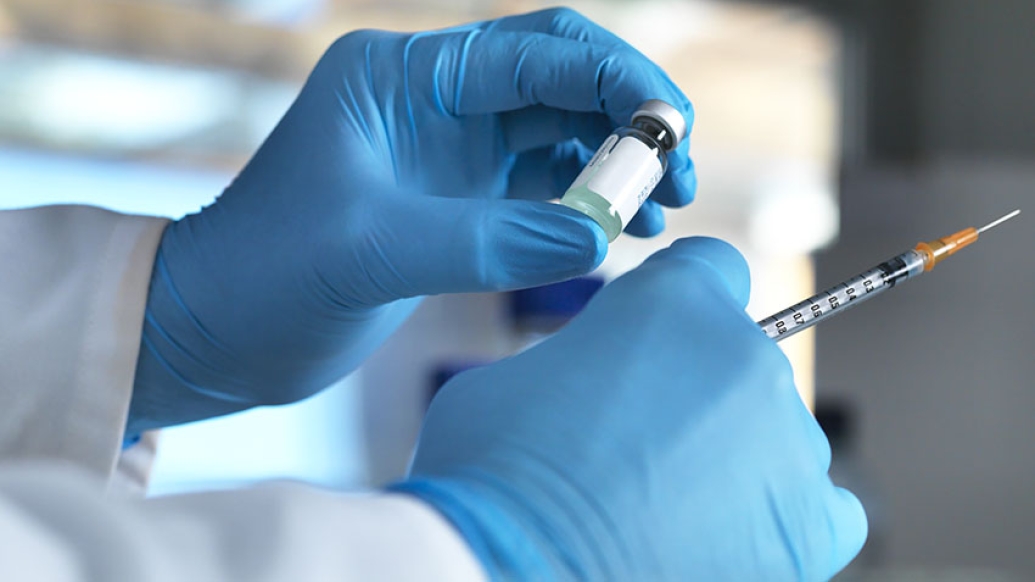Clinical trial shows promise of immune treatment against HPV infections that lead to cancer
2:34 PM
Author |

A potential new immune-based therapy to treat precancers in the cervix completely eliminated both the lesion and the underlying HPV infection in a third of women enrolled in a clinical trial.
The shot, a therapeutic vaccine, injects a specific protein that triggers an immune system response to attack high-risk HPV types that cause nearly all cervical cancer precursors, known as cervical intraepithelial neoplasia, or CIN.
LISTEN UP: Add the new Michigan Medicine News Break to your Alexa-enabled device, or subscribe to our daily audio updates on iTunes, Google Play and Stitcher.
"There are very few products trying to cure women who already have an HPV infection," says Diane Harper, M.D., M.P.H., M.S., professor of family medicine and obstetrics and gynecology at Michigan Medicine. "It's very exciting. This is the first time we've seen something with this success rate that is relatively easy to implement."
Cervical precancerous lesions are divided into three grades of severity. CIN 1 lesions generally clear up on their own. CIN 2 lesions often clear up on their own, but can also progress to CIN 3 lesions. CIN 3 is the most severe. It's a very slow-growing disease, though: fewer than half of CIN 3 lesions will have become cancer within 30 years.
"But we have no way to determine which women with CIN 3 will progress to cancer and which women will not. So we treat all women with CIN 2 or 3 as if they are likely to develop cancer," Harper says.
The study enrolled 192 women diagnosed with CIN2 or CIN3, randomizing 129 to receive the vaccine and 63 to receive a placebo. Women were given three shots in their thigh, one per week for three weeks. Six months later, the women were treated with standard surgical procedures for CIN 2/3 and the removed tissue was examined.
Women who received the vaccine were more than twice as likely as those who received placebo to see their CIN eliminated regardless of the type of HPV infection. The results were most striking in the more-severe CIN3: at least 15 percent and as much as 36 percent of those who got the vaccine saw their CIN3 eliminated, while none of the women in the placebo group did.
It actually treats the cause of the disease, which is HPV.Diane Harper, M.D., M.P.H., M.S.
Researchers followed the participants for another two and a half years after surgery, the longest any study has followed women in these trials. They showed that long-term follow-up was better for those who received vaccine over placebo, with more women in the vaccine group remaining completely clear of HPV. The study is published in Gynecologic Oncology.
Harper notes that the therapeutic vaccine, called Tipapkinogen Sovacivec, or TS, is completely different from Gardasil9, the vaccine given to prevent HPV infection. While Gardasil9 prevents HPV infection from occurring, TS clears tissue already infected with HPV. CIN2 and CIN3 are always caused by high-risk HPV infections.
MORE FROM MICHIGAN: Sign up for our weekly newsletter
The typical treatment procedure for CIN2 or CIN3 involves removing a cone-shaped piece of the cervix, called a LEEP or a cone. This results in scarring and a shortened cervix, which can cause problems during childbirth and lead to increased risk of caesarean section. In addition, women who have this procedure have a very high risk of developing cervical cancer over the next 20 years if they do not continue to be screened.
"The surgical procedure removes all the tissue that is headed towards cancer, but it doesn't remove all the HPV. You're not home free. You still have HPV," says Harper, an internationally recognized HPV researcher and member of the University of Michigan Rogel Cancer Center and senior associate director of the Michigan Institute of Clinical and Health Research (MICHR).
With the vaccine, researchers found that it not only eliminated the lesions but also eliminated the HPV infection.
"It actually treats the cause of the disease, which is HPV," Harper says.
Women who received the vaccine injections reported sometimes-severe reactions at the injection site. Harper says that was expected, because the vaccine is designed to trigger the immune system. An immune reaction is likely to inflame the skin.
The study looked only at cervical lesions, but HPV is linked to several other types of cancer, including head and neck cancer and anal cancer. The researchers envision testing TS for these cancers in the future. Additional clinical trials are needed before seeking approval for TS from the U.S Food and Drug Administration. No trials are currently available.

Explore a variety of health care news & stories by visiting the Health Lab home page for more articles.

Department of Communication at Michigan Medicine
Want top health & research news weekly? Sign up for Health Lab’s newsletters today!





